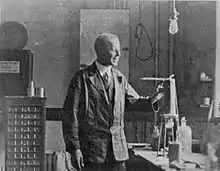Bertram Boltwood
Bertram Borden Boltwood (July 27, 1870 Amherst, Massachusetts – August 15, 1927, Hancock Point, Maine) was an American pioneer of radiochemistry.
Bertram Borden Boltwood | |
|---|---|
 Boltwood at Yale 1917 | |
| Born | July 27, 1870 |
| Died | August 15, 1927 (aged 57) |
| Nationality | United States |
| Alma mater | Yale University |
| Known for | Radiochemistry |
| Scientific career | |
| Fields | Radiochemistry |
| Influences | Ernest Rutherford |
| Influenced | Arthur Holmes |
He graduated from Yale University, and taught there 1897-1900. He established that lead was the final decay product of uranium, noted that the lead-uranium ratio was greater in older rocks and, acting on a suggestion by Ernest Rutherford, was the first to measure the age of rocks by the decay of uranium to lead, in 1907. He got results of ages of 400 to 2200 million years, the first successful use of radioactive decay by Pb/U chemical dating (isotopes not discovered yet). More recently, older mineral deposits have been dated to about 4.4 billion years old, close to the best estimate of the age of earth.
Boltwoodite is named after him. He was a member of the Connecticut Academy of Arts and Sciences.
In his later days, Boltwood suffered from depression and committed suicide on August 15, 1927.
References
- Boltwood, Bertram (1907) "The Ultimate Disintegration Products of the Radio-active Elements. Part II. The disintegration products of uranium." in American Journal of Science series 4, volume 23, pages 77–88. doi:10.2475/ajs.s4-23.134.78
- Badash, L. (1986) "Rutherford, Boltwood, and the Age of the Earth: The Origin of Radioactive Dating Techniques", in Proceedings of the American Philosophical Society, volume 112 (3), pages 157-169.
- Vacher, H.L. (2003) "Computational geology 26: Mathematics of radioactivity - When the Earth got old" in J. Geol. Educ. 51, 436-445.